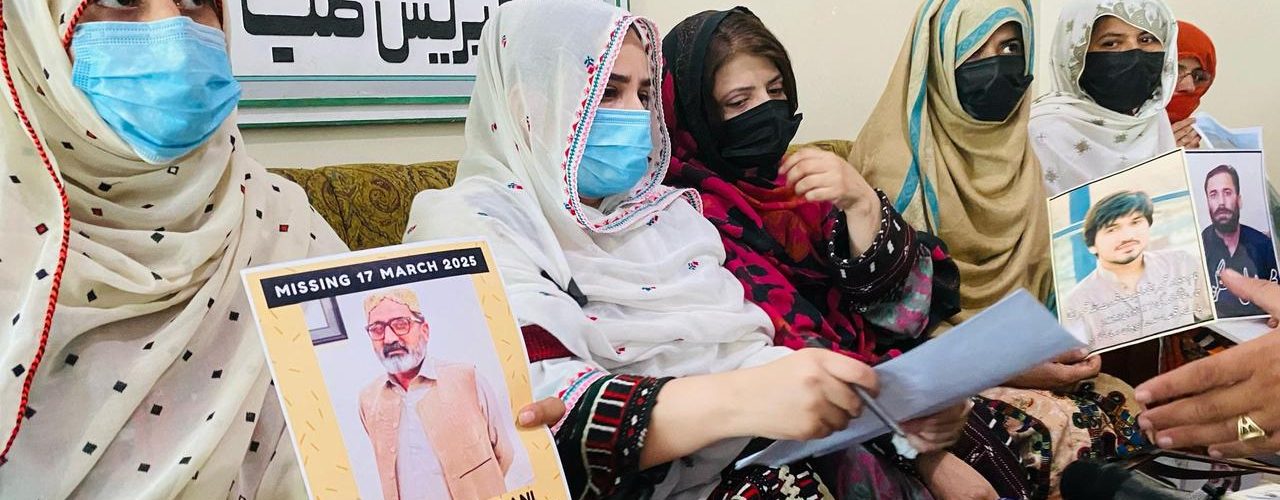Imagine the anguish of the Qambarani family, hunched over this very article in the dim hours of March 19, 2025, at 3 a.m., their weary fingers racing to chronicle a saga of loss that refuses to end. As I neared completion yesterday, March 18, another name pierced the silence—Haji Abdul Rehman Qambrani, abducted in the same chilling manner as his brother Nasir Qambrani just two days prior, on March 17, 2025. Another victim of the state’s displaced rage, another photograph joins the haunting gallery of missing Qambarani brothers, compelling me to rewrite this piece yet again. Haji Abdul Rehman, seized in a mirrored act of brutality, becomes the latest testament to a family’s unrelenting torment—a torment born of their brilliance and resilience in the face of Pakistan’s wrath.
The Qambarani family of Balochistan stands as a testament to the enduring spirit of the Baloch people, renowned for their intellectual vigor, philosophical insight, and steadfast commitment to their community’s progress. This distinguished lineage has produced an exceptional array of scholars, activists, artists, and mediators who have profoundly shaped Balochistan’s cultural and social fabric. However, their prominence has made them a target of the Pakistani state, which views their efforts to empower the Baloch as a challenge to its dominance. This raises a critical question: Is the Qambarani family a genuine threat to Pakistan’s authority, or does the state’s harsh response betray its own insecurities—an attempt to suppress a burgeoning Baloch identity? Reports from reputable sources such as Amnesty International, Human Rights Watch (HRW), and The Balochistan Post suggest the latter, revealing a pattern of systematic oppression aimed at extinguishing the family’s influence and the broader Baloch aspirations they represent.
A Legacy of Intellectual and Social Leadership
For generations, the Qambarani family has been a cradle of intellectual and social advancement, fostering individuals who personify the Baloch quest for dignity and autonomy. Nadir Qambarani, a respected scholar and advocate, has galvanized many through his dedication to education and justice, embodying the family’s ethos of enlightenment and rights advocacy. Maulvi Abdul Kabir Qambarani, a prominent religious figure, blended spiritual guidance with a commitment to social welfare, leading his community with wisdom during challenging times. Nausheen Qambarani, an acclaimed writer, poet, philosopher, and national singer, has enriched Baloch heritage with her poignant works, giving voice to the hopes and struggles of her people. Nasir Qambarani, a tribal elder and social activist, has tirelessly worked toward peace and community upliftment, seeking to bridge divides in a region scarred by conflict and neglect.
Together, these individuals showcase the Qambarani family’s remarkable ability to nurture leaders who confront injustice and envision a prosperous future for Balochistan. Their endeavors reflect the wider Baloch movement for recognition and development—a movement met with fierce opposition from Pakistani authorities. Amnesty International’s 2024 findings on enforced disappearances in Pakistan highlight how such cultural and intellectual contributions often provoke state repression, targeting those who drive societal change.
Pakistan’s Targeted Campaign Against the Qambarani Family
Rather than celebrating the Qambarani family’s contributions, the state has branded them as adversaries, subjecting them to a relentless campaign of abductions, torture, and extrajudicial killings. This is not a random act of aggression but a calculated effort to dismantle any force capable of strengthening the Baloch nation, as evidenced by extensive documentation from HRW and the Human Rights Council of Balochistan (HRCB). HRW’s 2011 report, “We Can Torture, Kill, or Keep You for Years,” exposed the systemic role of security forces—such as the Frontier Corps (FC) and intelligence agencies—in targeting Baloch nationalists, a practice that has ensnared the Qambarani family due to their influential legacy.
The assassinations of Maulvi Abdul Kabir Qambarani (HRCP) and Malik Noor Ahmed Qambarani in June 2012 (SATP) stand as stark examples of what appears to be a calculated and relentless campaign of targeted violence against the Qambarani family, unfolding within the volatile tapestry of Balochistan. Maulvi Kabir, a respected religious scholar whose influence likely extended deep into the community’s spiritual and social fabric, and Malik Noor Ahmed, a tribal leader wielding significant authority in the region’s intricate power dynamics, were both struck down in acts that suggest a deliberate effort to dismantle their family’s prominence.
The impact on the family has been devastating, particularly among its younger generation, with many disappearing into Pakistan’s opaque detention system or suffering violent fates. Drawing on the HRCB’s March 18, 2025, report—which documented 144 enforced disappearances in Balochistan in February 2025 alone—the following list details known cases of Qambarani family members affected by this repression:
- Nasir Qambarani: Forcibly disappeared on March 16, 2025, by the Counter Terrorism Department (CTD) and intelligence agencies from Killi Qambarani, as reported by Multiple media outlets. This marked his second abduction, having previously endured detention from 2015 to 2018 (The Balochistan Post, March 17, 2025).
- Haji Abdul Rehman Qambarani: Forcibly disappeared on March 19, 2025, by the Counter Terrorism Department (CTD) and intelligence agencies from Killi Qambarani, as reported by media outlets.
- Gazzain Qambarani: Abducted in July 2015 from Killi Qambarani, he was later killed in a staged “encounter” on August 13, 2016, a method widely criticized by human rights groups as a pretext for extrajudicial executions (HRCB, 2020).
- Sulaiman Qambarani: Taken with Gazzain in July 2015, he met the same fate in the 2016 encounter, compounding the family’s grief (HRCB, 2020).
- Hizbullah Qambarani: Seized on March 4, 2016, from Killi Qambarani, his whereabouts remain unknown nearly a decade later, a case reflective of thousands tracked by the Voice for Baloch Missing Persons (VBMP, 2023).
- Hassaan Qambarani: Abducted alongside Hizbullah on March 4, 2016, he too has vanished, underscoring the unchecked impunity of these acts (HRCB, 2020).
- Ibrar Qambarani: A university graduate, taken from his Quetta home on January 16, 2025, amid a surge of disappearances reported by The Balochistan Post, highlighting the targeting of educated youth (The Balochistan Post, January 17, 2025).
- Asim Qambarani: A 13-year-old, detained with his brother Bilawal on January 8, 2025, in Kharan, illustrating the indiscriminate scope of these abductions (The Balochistan Post, January 9, 2025).
- Bilawal Qambarani: A 14-year-old, taken alongside Asim on January 8, 2025, with his family pleading for international intervention (The Balochistan Post, January 9, 2025).
- Asghar Qambarani: A Brahvi singer, abducted by the FC from Killi Qambarani in early 2025, adding to the family’s cultural toll (HRCB, February 2025).
These incidents, though harrowing, represent only a fraction of the family’s ordeal, each case a poignant reminder of the human toll exacted by Pakistan’s policies. The HRCB’s February 2025 data reinforces this trend, noting house raids as a primary abduction tactic, with Nasir’s case among the 144 recorded that month.
The Qalandarani Parallel: A Wider Tapestry of Persecution in Balochistan
The plight of the Qambarani family is not an isolated tragedy but part of a broader, recurring pattern of suffering that reverberates across Balochistan, mirrored starkly in the experiences of families like the Qalandarani. The Qalandarani name carries weight in Baloch oral traditions, etched into collective memory by a horrific massacre that nearly obliterated their lineage. This devastating event, widely attributed to security forces intent on crushing their resistance, stands as a grim testament to the cost of defiance in the region. Much like the Qambarani, the Qalandarani have faced unrelenting reprisals for their refusal to submit, their story woven into a larger narrative of targeted persecution endured by Baloch families who dare to assert their identity and autonomy.
This cycle of violence has not gone unnoticed. Paank, the human rights wing of the Baloch National Movement, has meticulously documented such atrocities, pointing to the Qalandarani massacre and similar incidents as hallmarks of a systematic campaign against resilient Baloch communities (Paank, 2022). Their reports paint a chilling picture of state-sponsored brutality designed to silence dissent and erase resistance. Echoing this condemnation, Amnesty International has decried these acts as flagrant breaches of international law, highlighting a pattern of abuses—extrajudicial killings, enforced disappearances, and collective punishment—that violate fundamental human rights (Amnesty International, 2024). Together, the Qambarani and Qalandarani sagas illuminate a broader struggle, where the price of survival is paid in blood, and the pursuit of justice remains a distant hope amid an unrelenting storm of oppression.
A Reflection of Pakistan’s Fragility
Pakistan’s intense focus on the Qambarani family stems not from their threat but from the state’s own vulnerabilities. Balochistan, rich in resources yet mired in poverty due to exploitation and military control, represents a region Pakistan fears losing grip over. The Qambarani family’s blend of intellectual leadership and community advocacy threatens this control by offering a vision of an empowered Balochistan. HRW’s 2025 World Report notes that such repression seeks to maintain a submissive status quo, quelling any spark that could fuel a larger movement for equity and self-determination. The Qambarani family’s persecution is a microcosm of this broader conflict, their targeting a symptom of Pakistan’s failure to address underlying grievances.
UN Scrutiny and a Pattern of Silence
Nasir’s 2015 abduction coincided with heightened international attention, notably from the United Nations Working Group on Enforced or Involuntary Disappearances (WGEID). In its 2015 communications, the WGEID pressed Pakistan to address hundreds of disappearances, many linked to intelligence agencies, though individual cases like Nasir’s were not named due to confidentiality. A 2011 Human Rights Watch report, “We Can Torture, Kill, or Keep You for Years”, documented the modus operandi of such abductions: no warrants, no charges, and no legal recourse. Nasir’s experiences—both in 2015 and 2025—fit this mold precisely, with the state offering no acknowledgment or redress.
A Legacy Tested, Yet Unbroken
The Qambrani tribe’s saga—from Maulvi Kabir’s assassination to Nasir’s ongoing ordeal—poses a stark question: Why does Pakistan target a family whose contributions could strengthen society? The answer lies in the state’s insecurity, a fear that progress among the Baloch could ignite demands for justice and autonomy. Each disappearance, each killing, is a strike against a thriving Baloch identity. Yet, amid this legacy of loss, the Qambranis endure, their resilience a beacon of hope in a region where silence is imposed but never fully achieved. Their story demands the world’s attention: How long will Pakistan’s fear be allowed to dim the brightest lights of the Baloch nation?
References and Additional Sources
- Amnesty International (2024): Reports on enforced disappearances, including references to Baloch activists like Mahrang Baloch, align with the Qambarani family’s experiences.
- Human Rights Council of Balochistan (HRCB, 2025): February data and March 18 report detailing 144 disappearances, including Nasir Qambarani’s case.
- Human Rights Watch (HRW, 2011, 2025): Historical and current analyses of state abuses in Balochistan.
- The Balochistan Post (2025): Articles from January and March documenting specific Qambarani abductions (e.g., Ibrar, Nasir, Asim, Bilawal).
- Voice for Baloch Missing Persons (VBMP, 2023): Statistics on missing Baloch, including Hizbullah and Hassaan Qambarani.
- Paank (2022): Historical perspective on violence against Baloch families like the Qalandarani.
- United Nations (2023): Calls for investigation into Pakistan’s enforced disappearances.








Add comment